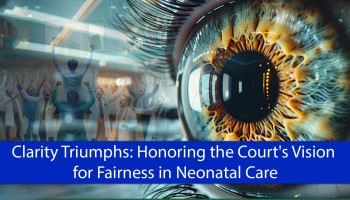In an interesting case of alleged medical negligence the NCDRC has refused to interfere with order of the Kerala SCDRC and disallowed the appeal against the Kerala State commission order of the year 2012.
Interestingly in the complaint related to the same case the Court of Chief Judicial Magistrate, Alappuzha had convicted respondent doctor under section 304 A IPC on 03.05.2011.
The Expert Committee appointed by the Police following the filing of the FIR which was headed by the District Medical Officer (DMO) gave the opinion that there was lack of reasonable care and exercise of skill in that particular case in timely detecting and preventing postoperative haemorrhage which was the cause of haemetometra and death of the subject.
In the final order NCDRC mentioned-
From a plain reading of the above (Expert opinion), it is evident that it is not based upon examination of the treating doctors or nursing staff of the respondent hospital. Its conclusions appear to be guided more by the post mortem report. If medical negligence has to be established, the standard of care and the following of medical protocol must necessarily be examined to arrive at a conclusion. In the case of criminal negligence to be established, mens rea must necessarily be established. The conclusion of the Expert Committee appointed under the DMO does not do so since its conclusion is that “there is lack of reasonable care and exercise of skill in this particular case in timely detecting and preventing post operative haemorrhage which is the cause of haemetometra and death of the subject”. The State Commission has therefore rightly disregarded the same. The State Commission has set out reasons for not being persuaded by the Expert Opinion placed before it. In light of the documentary evidence that the deceased patient had a history of bronchitis even during the previous delivery in the same hospital and was indeed provided the standard of care expected while in the respondent no. 1 hospital and the lack of evidence produced by the appellant to support its case that such medical care was not provided, the impugned order cannot be faulted.
The brief facts of the case
Appellant no.1’s wife, (deceased), was admitted on 20.05.2004 for her second delivery in the respondent no.1/ hospital as inpatient. The hospital conducted a detailed check-up of the deceased on 21.05.2004 and found that the deceased was healthy and decided to conduct a caesarean operation after going through all the previous medical records of the deceased. The caesarean operation was conducted on 22.05.2004 at around 12.50 pm using spinal anaesthesia and appellant no.3 was born around 01.03 p m. Appellant alleges that during the caesarean operation neither the general surgeon nor a senior gynaecologist were present. After the operation, appellant no.1 informed that the deceased was not feeling well and was having breathing problems. On 23.05.2004, appellant no.1 again informed respondents that the deceased was not feeling well and had breathing problems. However, the respondent instead of taking extra care, conducted only a routine check-up and found her to be completely fit. According to appellant no.1, the respondent never paid any heed to the request of the appellant no.1 to shift the patient/deceased to a better hospital. On 24.05.2004 the appellant again informed his wife’s condition and requested the respondent to allow him to shift to some other hospital. The respondents informed that they had all facilities including ventilator etc., being a super facility hospital and refused to shift the patient to another hospital. However, on 25.05.2004 at about 02.00 p m the respondents informed appellant no.1 that the condition of his wife was not satisfactory and due to insufficient staff in the hospital of the respondent to accompany the wife of the appellant no.1 to the another Hospital at Ernakulam which was only half an hour distance from the hospital. The respondents took the wife of appellant no.1 to the Medical Trust Hospital, Ernakulam at around 05.00 pm when the night duty staff nurses reached the hospital. However, on the way to the Hospital, the condition of the appellant’s wife worsened and she was brought back to the hospital of respondent no.1, where she was declared dead. Appellant no.1 immediately lodged FIR no.343 of 2004 with the Police Station, Alappuzha the same day. The appellants also filed an Original Complaint on 20.05.2006 before the State Commission, Kerala seeking compensation of Rs.50 lakhs for medical negligence, deficiency in service, mental agony etc.

The State Commission dismissed the complaint filed by the appellants. Hence, the appellant filed an appeal to NCDRC.
Allegations by the complainant-
It was also submitted by the learned counsel for the appellant that the respondents were forced to bring the deceased back to respondent no.1 hospital after travelling halfway to the Medical Trust Hospital, Ernakulam since the staff accompanying the deceased in the ambulance found the condition of the deceased deteriorating due to lack of oxygen in the cylinder. The post mortem report of deceased clearly shows that the deceased died due toshock following haematometra and postpartum haemorrhage. It was contended by appellant that respondents could have arrested haematometra and postpartum haemorrhage by consulting an expert or detecting the same and taking timely appropriate care as per the advice of expert doctors. It is also contended that the report submitted by the Medical Board was completely ignored by the State Commission.
Respondent doctor denied all allegations-
The counsel for the respondent denied all the allegations made against them by the appellants. It was contended that there was no lack of pre-operative and post-operative care to the deceased or any sort of medical negligence. The deceased was examined by the doctors of the respondent hospital and it was decided to shift the patient to a higher centre. The doctors at the respondent hospital suspected pulmonary embolism and in view of the medical complication decided to transfer the patient to a higher centre for adequate medical attention. Learned counsel for the respondent further submits that the allegation that the deceased developed breathlessness on 24.05.2004 was false, since the deceased complained of breathlessness only on 25.05.2004 as per the case sheet of the deceased. As the condition of the patient started to deteriorate despite the best efforts by the respondent hospital, it was decided to take the patient to Medical Trust Hospital, Ernakulam. The learned counsel for the respondent further contended that attributing the death of the patient to over dosage of sedatives was totally false and baseless.
Final order by NCDRC-
After hearing both parties the NCDRC passed the order-
Medicolegal expert's opinion on the case-
Dr Gaurav Aggarwal, medicolegal expert and lawyer raises some important questions -
1. The medical experts did not apply Bolam's test (did not mention in their report) to determine whether there was medical negligence or not.
2. The experts did not know how to write the 'expert opinion', they should have applied the rules in accordance with the principles laid down in Jacob Mathew Vs State of Punjab judgment.
3. The irony is that while the same case was adjudged by Hon'ble judicial officers in the same nation, by the judicial officers who have to follow the same principles of law, and read the same facts, have applied starkingly opposite logic to conclude that there was medical negligence on the one hand(criminal court) and there was no medical negligence on the other hand(Consumer Court).
4. More importantly, when there was contradicting interpretation of the same report (post-mortem report) by two courts(criminal and consumer), then the accused doctor should have been given the benefit of doubt and should have been not held guilty of negligence. This is as per well settled principles of law that criminal courts require the evidence to be "beyond reasonable doubt" in holding the accused party guilty, while civil courts(including consumer) require mere preponderance of probability to hold the same.
5. A simple reading of the entire case leads one to wonder if the judgment was against settled principles of law.
Click here to access the order by NCDRC-






Recent comments
Latest Comments section by users
Guest
Apr 27, 2024
Very informative article, and nice learnings from the case. Thanks for the write-up.